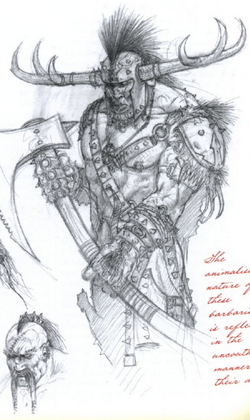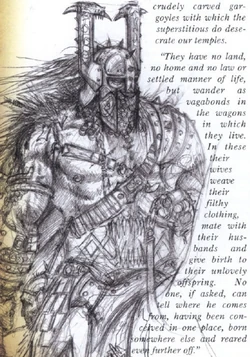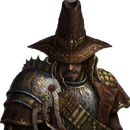"We make deal, yes?”
“You give us gold and women, we no attack.”
“You not give enough gold or women, so we attack.”
“We attack anyway.”
“We make deal, yes?"
- —Hung negotiations[2a]

One of the few sketches depicting the Hung people.
The Hung are a nomadic culture of Far Eastern Human hunter-gatherers, shorter and squatter than the people of Grand Cathay but otherwise resembling them. The Hung and the more-brutal Tong are perhaps the most eastern of all the tribes of the Northmen, inhabiting the lands of the Chaos Wastes to the north of Cathay and the chilly lands of Naggaroth in the New World.[1a]
The Hung are considered horsemen par excellence, and they breed tough, small horses on their cold mountain slopes which survive where larger southern warhorses would starve. They ride these mounts into battle when they attack the more civilised lands to the south, such as the petty yet equally barbaric kingdoms of the Dark Elves.[1a]
Out of all the peoples living in the Northern Wastes, the Hung are perhaps the most primitive. Even though their brethren in the west have built themselves a selection of settlements and massive fortresses, the Hung can account themselves no better than primitive hunter-gatherers, with little-to-no concept of even the barest forms of civilisation. Instead, these wandering nomads scour the land in search of plunder and battle to sustain themselves, and such is their reputation that the people of Grand Cathay built the mighty Great Bastion, one of the largest walls ever created, for the sole sake of keeping these barbarians from destroying their empire.[1a]
Savage Nomads
"The Hung are Human, though like others who dwell near the Umbra, they are often riddled with mutations. Short, squat, with thick necks and wide faces, they are an ugly people, made uglier by self-mutilation. From the moment of birth, cruel mothers cut deep gashes into their children’s cheeks so that when the youths grow into men, their facial hair is checked by ugly scars, making them look like beardless eunuchs. These savages never bathe, and so have a terrible stink, covered in their own excrement and filth as if they were feral beasts."
- —Gregor of Marienburg, Merchant and Explorer.[2a]

The Hung are so squat in their appearance that they even have no necks.
On the other side of the Known World, there are other Humans who serve the Dark Gods. Separated from the Kurgan by the Great Desert, they are often contained to the lands north of Grand Cathay or across the land bridge in the northern reaches of the New World. Like the Kurgan of the Eastern Steppes, the Hung raid their neighbours, mounting attacks against the fabulous cities of Grand Cathay or the sinister cities of the Dark Elves of Naggaroth. They are almost constantly in a state of war. The reason is simple. They believe the purpose of their existence is to fight, to kill, and to slaughter. By fighting amongst themselves, the Kurgan, and others, they glorify themselves and their Dark Gods.[2a]
Like the Kurgan, the Hung are nomads, but instead of riding horses, they use tough ponies bred for endurance and survival in the harsh climes of their hunting grounds. These people live in the saddle. Some say they are even born there. Each member of the tribe carries on their stout steed a filthy woolen tent and everything they need to get by. The Hung see all members of their tribe as equals and make no distinction between men and women. There are many smaller tribes among the Hung people, including the Yin, Chi-An, Tu-Ka, Mung, Aghols, Wei-Tu, Man-Chu, Dreaded Wo, and the Kuj, though they are all part of the greater ethnic group that is the Hung.[2a]
Also like the Kurgan, the Hung are a roving people, and thus their tribal boundaries cannot be marked by a simple frontier on a map. While they pay more regard to their greater tribe over and above their itinerant kin, these tribes hold no compunction about merging with others to form great alliances, or devolving and reforming as the winds of circumstance change. This ever-shifting loyalty leads them to consider bonds and bargains made with other races as irrelevant. They feel no dishonour in breaking these pacts, or indeed in killing the other parties, and so have gained a reputation for being sly, deceitful, and treacherous. Indeed, the Cathayans use the phrase "Word of a Hung" to denote a worthless promise.[1a]
Culture
"Word of a Hung"

A scholar's sketch of a Hung chieftain
Though they owe their allegiance to the greater tribe, the Hung honour no promises and abide by no pacts. They are famous for their treachery and for their willingness to kill each other as well as others they meet. They are a sly people, cunning in their dealings and quick to double-deal. For example, they might encircle a town and promise to leave the town unscathed if the people give over their daughters. Once the town complies with their wishes, the Hung butcher the townspeople and burn down all the buildings simply because they can. They have a taste for fine things, so they snatch up gold, silks, and even gaudy ornamental rugs, which they display proudly whenever they settle in to camp. Despite their pretense, they know nothing of civilisation and are an unsophisticated lot.[2b]
In truth, the Hung are not much more than simple hunter-gatherers, and the hunting aspect forms a cornerstone of their culture. They see each hunt as an opportunity to prove their strength and courage, so they prowl the dark places of the Chaos Wastes looking for some deadly Chaos Spawn or mutated creature to kill and bring back as food. One thing the Hung do value more than treasure are their hunting dogs. They keep a vicious breed of canine that's so abused and malnourished it's hardly recognisable as a dog. Their cruelty instils a sense of loyalty in these stupid beasts, so they run alongside their masters in battle, savagely tearing foes apart. The Hung extend the same treatment to their steeds, which they feed a mixture of grains and Human blood to make them fierce and unpredictable.[2b]
The Hung's territory does not produce much in the way of food, so their diet can be macabre. They readily devour game and fish, but when the hunting is scarce, they feed on rats, insects, even the lice on their bodies. Some witnesses report seeing these savages devour the afterbirth from a mare's foaling. And failing that, they drink the blood from their steeds and even turn to cannibalism if necessary. This abhorrent behaviour is compounded by the filthy conditions in which they live, for they refuse to wash their bodies or their clothes or bury their refuse, for they believe it will anger their gods. Both men and women mutilate themselves in order that they may present a more fearsome, or lovely, visage.[1a][2b]
The only structures the Hung inhabit are woolen tents they carry, with which they make their encampments. Obscure legends speak of Hung cities, hidden somewhere in the Eastern Steppes or in the mountains to the north. These places are supposedly great centres for their worship, and guard the fabulous treasures the Hung have plundered and stolen over the centuries. More than one treasure-seeker has departed from Grand Cathay and the Empire in order to find these hidden cities, and never returned.[1a]
If such stories have any basis in fact, then it is from the lavish encampments of the Hung's largest tribes. There the spoils of their raiding such as silk and gold and carpets are displayed with such garish opulence that they could be considered travelling palaces. Despite these displays of borrowed civilisation, they know nothing of the more sophisticated ways of life. The Hung do not even know how to build a bridge across a river, rather they prefer to pile their possessions on top of their horses and swim them across, holding onto their tails.[1a]
Warfare
"The unwashed hordes of the Hung represent everything I hate about Humans. They stink, they're fools, and they are all too easily corrupted by Chaos."
One might think that the Hung would leave their lands, given its conditions -- and they do, but only to raid. They remain in their hunting grounds because they believe the gods dwell in all things there. When lightning strikes, they see the image of the God of Blood. In their own leavings, they see the God of Decay. As a result, they keep no shrines or altars, though they do construct monoliths as the Kurgan do. Instead, these foul people honour their Dark Gods by praying to rude idols or offering them thanks at mealtimes by rubbing their meat and broth into the coats of their steeds.[2b]
Storm of Chaos
|
Attention, Empire Citizens!
This article or this section of the article contains information regarding the Storm of Chaos campaign and its aftermath, which is now considered a non-canon, alternate timeline.
|
During the alternate timeline of the Storm of Chaos, many Hung fell under the control of Morathi, the Dark Elf Hag Queen and mother of Malekith, the Witch King of Naggarond. To reinvigorate the cult of Slaanesh amongst her people, she and a coven of cultists travelled into the far north to wrest control of the Hung for her own sinister purposes. A great many tribes joined her and followed her south to Lustria, though to what end, none can say.[2b]
Notable Tribes
"The Kurgan tribes are not alone in the Northern Wastes of Chaos. Far beyond the Eastern Steppes are a people of wanderers and vagabonds known as the Hung. Thankfully, they rarely find their way into the Old World, being content to fling themselves against the Great Wall of Cathay or to sell their lives in battle against the Druchii of Naggaroth. Though removed from the affairs of the Empire, the Hung are a vicious race and have, in the past, emerged from their distant land to lend their might to the armies of Chaos."
- —Soren Fitzgerald, Professor of History at the University of Nuln[2a]
Notable Hung tribes include:
- Aghols
- Chi-An
- Dreaded Wo
- Kuj
- Man-Chu
- Mung
- Tu-Ka
- Wei-Tu
- Yin
Quotes
"Never trust a Hung. Destroy and eat them, yes. Never trust them."
- —Azeekel, Kurgan Marauder[2a]
"Them Kurgan is bad. But the Hung, they jus' nasty."
- —Gorg, Ogre Philosopher[2a]
"We most certainly trade with the Hung. It is in our interest to trade with all the people of the world's roof. Whilst I admit I would never turn my back on a Hung, I'm more than happy to accept his slaves."
- —Zygrad, Chaos Dwarf Sorcerer[2a]
Trivia
Just as the Kurgan are based on the Turks, Scythians and other nomadic civilisations who dwelled west of the Altai Mountains in Central Asia, the Hung are based on the Huns, Mongols, and the Xiongnu steppe nomads who originated in the lands east of the Altai, such as northern China, Mongolia and Manchuria. One of the Hung's tribes, the Man-Chu, was named after the nomadic Manchu people of eastern China who founded the last of the Middle Kingdom's imperial dynasties, the Qing.
This may explain the distinction between the Kurgan and Hung. Though they share nomadic cultural similarities, their geographical separation between eastern and western mirrors the similar separation of the nomadic tribes of Central Asia, such as those between the Turkic tribes and the Mongols.
The Hung practice of not bathing is similar to a custom of the Mongols. According to tradition, the Mongols believed that powerful spirits inhabited the streams and rivers, and to bathe in them would bring great misfortune. As such, the Mongols were known to not bathe or clean their clothes. In fact, it was even customary to punish those who would break such tradition.
The description of the Hung being primitive hunter-gatherers is similar to the descriptions of the "Wild" Jurchen tribes of Manchuria as idnetified by the Ming dynasty in the 14th century. These tribes of nomads are so named because they share the hunter-gatherer culture of the Siberian tribes which live in the tundra of northern Eurasia, distinct from the more sedentary, agricultural branch of their people who live to the south. The Wild Jurchens, as their name suggests, lived in the wilds of the northern tundra. The descendants of Wild Jurchens today do not identify themselves as Manchus like their fellow former Jurchens. Instead, they formed different Indigenous nations such as the Nanai, Evenks, Negidals, Oroqen and Nivkh who live in what is today northern China and the Russian Far East. The word Yeren (野人) in Chinese means "wild people," i.e. "savages." Yeren had been a general name for all Jurchen tribespeople before the rise of the Jianzhou Jurchens and Haixi Jurchens. As vassals to Ming China, the Jianzhou and Haixi Jurchen groups became culturally closer with their Chinese overlords while the rest of Jurchens who did not establish a connection with the Ming are known as the Wild Jurchens.

